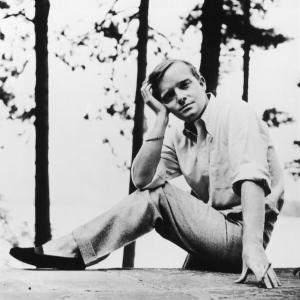
Source: Flicker user Peggy O’Connor
License
My dive into Rochester’s own Laurence Olivier continues, this time with Bennett Miller’s Capote (2005). I’d put it off for some time for the obvious reason: it received five Oscar nods and won Hoffman an Academy Award for Best Actor. It’s a biopic. I remembered the trailer where he spoke in a half-helium caricature of a dead twentieth-century gossip. Being frank, I feared seeing PSH reduced to a single role, a once-in-a-lifetime bit of Oscar bait to the detriment of his robust and wonderful catalogue.
Plus, I hated Synecdoche, New York (2008). I’ve learned that the more vaunted his performance, the more suspicious I should grow.
How wrong I was. Capote is a God’s honest character study. It has none of the stink of the modern biopic, in which the family steps in, keeps everything clean—you know, tidies the place up so that Elvis never died on the toilet (or at least was moved there after expiring from being too good at rock n’ roll). Not sure Capote had any remaining family then, but that is beside the point. Hoffman’s Truman Capote is built of flesh and blood, a catty, egotistical writer, who, in his way, finds room for love and self-doubt.
The movie begins and ends with Capote’s reporting and writing In Cold Blood (1966), his “non-fiction novel” about a quadruple murder in Kansas and how close he grew to the killers. He mines them for material, acquires a highfalutin lawyer for them, and then abandons them to broken necks and historical amnesia (absent his control over their memory anyway). By the end (and paraphrasing here), he laments to his friend Harper Lee (Catherine Keener) “I did everything I could” only for her to answer, “Maybe. But you didn’t want to do more.” Who is killing in cold blood now?
As a closing title card tells us, Capote went on to even greater fame because of In Cold Blood’s success. He never wrote another novel and drank himself to death. Was it worth it? That is the question any artist desirous of success must ask themselves, though in the present tense. How many relationships is it worth destroying? How many lives can I vampirize? How long will people put up with me? The nigh shelved Prince documentary puts these questions in the spotlight (and, of course, faces oblivion because of his estate). Here, we experience such searching through Capote.
Did I mention Bob Balaban plays Wallace Shawn’s real life dead and New Yorker editor William Shawn?
It all comes back to Hoffman. His portrayal is certainly more asexual than we might expect were this film made today. His partner is in the movie, though mostly by way of Capote’s shirking him to work on the book. Otherwise, it surpasses what one might look forward to now. He captures the essence of Truman Capote in mannerism, voice, and style without actually imitating or copying him. The character feels strange (and speaks of this otherness!) without ever veering into caricature.
Should that have surprised me? Not really. It’s Philip Seymour Hoffman. I still hate Synecdoche, New York though.













